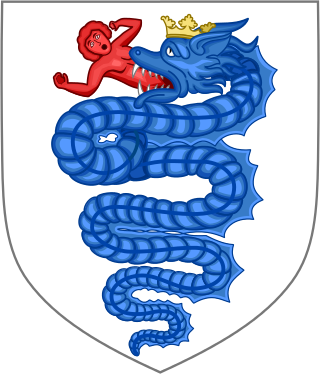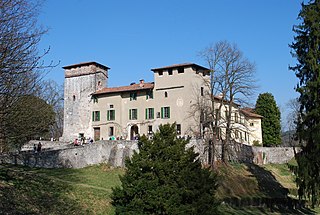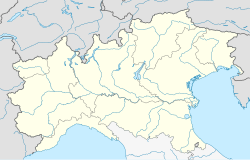
The biscione, less commonly known also as the vipera, is in heraldry a charge consisting of a divine serpent in the act of giving birth to a child. It is a historic symbol of the city of Milan, used by companies based in the city.

The Rocca Borromeo di Angera, or Rocca d'Angera, also called Borromeo Castle, is a rocca on a hilltop above the town of Angera in the Province of Varese on the southern shores of Lago Maggiore. It has medieval origins and initially belonged to the Milanese archbishop. It passed then to the Visconti of Milan and later to the Borromeos, who are still the owners.

The Visconti Castle of Bereguardo, Castello Visconteo of Bereguardo in Italian, is a medieval castle in Via Castello 2, Bereguardo, Province of Pavia, Lombardy, Italy.

The Visconti Castle, or Castello Visconteo, is a castle located in the town of Cusago near Milan, Lombardy, Northern Italy. It was built in the 14th century by Bernabò Visconti and used as a hunting lodge by him and other Visconti family members. The castle underwent significant changes in the Renaissance period; today, it is in neglected conditions.

The Visconti-Sforza Castle of Novara is a castle located in the south-western border of the old center of Novara. It was erected on the former corner of the Roman and Middle Age walls that surrounded the city.

The Visconti Castle of Abbiategrasso is a medieval castle in Abbiategrasso, Lombardy, northern Italy. It was among the first Visconti castles built according to their typical quadrangular layout. In the 14th and 15th centuries, it was one of the preferred residences of the duchesses of Milan of the Visconti and Sforza houses. Today, the castle's surviving part serves as the seat of the municipality of Abbiategrasso.

The Visconti Castle of Binasco is a medieval castle in Binasco, Metropolitan City of Milan, Lombardy, Northern Italy. It is famous for having been the prison and execution place of Beatrice di Tenda, who was arrested and sentenced to death for adultery in 1418. Today, it is the seat of the Municipality of Binasco.

The Visconti Castle of Massino is a medieval castle located on the Vergante hills in the municipality of Massino Visconti, Province of Novara, Piedmont, northern Italy. Since the 12th century it has been a possession and one of the preferred residences of the Visconti of Milan. At that time it was frequented by the family ancestor of the lords and dukes of Milan. Afterwards its property was transferred to other collateral branches of the lineage, from the initial Visconti di Massino to the current Visconti di San Vito.

The Dal Pozzo Castle is a castle of medieval origin located in Oleggio Castello, Province of Novara, Piedmont, northern Italy. In the 19th century, it underwent profound transformations providing it the current neo-Gothic Tudor aspect. Today it is the seat of a hotel.

The Visconti Castle of Crenna is a castle of medieval origin located in Crenna, district of Gallarate, Lombardy, Northern Italy. It is linked to the fame of Lodrisio Visconti, who raised against and then reconciled with the family members of his cousin Matteo Visconti, Lord of Milan. In the 14th century, the castle underwent expansion and destruction according to the alternative fortunes of Lodrisio.

The Visconti-Castelbarco Castle is a castle of medieval origin located in Cislago, Lombardy, Northern Italy. It belonged to a cadet branch of the Visconti House since the 13th century and became the property of the Castelbarco family in the 18th century.

The Visconti Castle of Castelletto is a castle of medieval origin in Castelletto sopra Ticino, Piedmont, northern Italy. It is named after the Visconti house, to which it belonged between the 13th and 20th centuries.

The Visconti Castle of Fagnano is a castle located in Fagnano Olona, Lombardy, northern Italy. It lies at the border between the town of Fagnano and the Olona valley.

The Visconti Castle of Jerago is a castle of Middle Age origin located in Jerago, Lombardy, Northern Italy. Having been a property of members of the Visconti house between the 13th and 18th centuries, it retains still today their memory in its name.

The Visconti Castle of Cherasco is a medieval castle in Cherasco, Piedmont, Northern Italy. It was built in the 14th century by Luchino Visconti, Lord of Milan, and partly reconstructed at the beginning of the 20th century.

The Visconti Castle of Vogogna is a medieval stone-made castle in Vogogna, Piedmont, Northern Italy. It was built in the 14th century by the Visconti, lords and dukes of Milan.

The Visconti-Sforza Castle or Sforza Castle of Galliate is a medieval castle in Galliate, Piedmont, Northern Italy. It was erected in the 15th century by the Sforza, dukes of Milan, on a previous fortification built by their progenitors Visconti.

The Agazzano Castle is a fortification located in Agazzano, in the province of Piacenza. The castle is located on the edge of Agazzano town, not far from the main square, which was intended to be defended by the castle, and it is located in the heart of the Luretta Valley, a short distance from the course of the Luretta creek, at a point of slight elevation difference, where the last hill extensions of the Ligurian Apennines give way to the Po Valley.

The Visconti Castle of Monza was a medieval castle in Monza, Lombardy, northern Italy. Its construction was initiated at the behest of Galeazzo I Visconti in the 14th century. In 1527, a revolt by the citizens of Monza demolished its tallest tower, marking the beginning of the castle's destruction. Today, only a small tower on the Lambro River survives, along with the remains of a drawbridge.

Tabiano Castle is a medieval manor house in the small district of Tabiano Castello, belonging to the municipality of Salsomaggiore Terme, in the province of Parma.

























